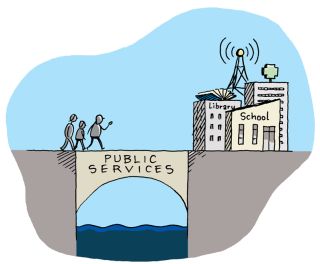Investment in Budget 2023 is an investment in the future

A 2020 report commissioned by the Society of St Vincent DePaul, and authored by Micheál Collins of UCD, examined The Hidden Cost of Poverty by estimating the public service cost of poverty in Ireland. It identified the additional public service costs that Irish society carries as a result of current and past experiences of poverty. The main estimate presented by the report found that the annual public service cost of poverty to Ireland is almost €4.5bn. Expressed in per capita terms this finding implies that poverty imposes a public service cost equivalent to a sum of €913 per person in the state each year (€2,600 per household). The report also noted that this additional public sector expenditure is equivalent to 5.1% of total General Government Revenue and 5% of total General Government Expenditure. Put another way, €1 in every €20 collected by the state from taxes, social insurance and charges ends up being allocated by the state to make up for the way that poverty damages people’s lives.
Social Justice Ireland welcomed this report, it provides a heretofore absent benchmark for the recurring annual costs to the state of poverty, and highlights for all members of society, whether they are above or below the poverty line, the costs incurred by society as a result of poverty. It also highlights the importance of Government adopting increased measures to address the extent of poverty in our society and to also to prevent the emergence of poverty, or its transmission across generations. Judged over time, there are significant benefits to society from a targeted anti-poverty programme, delivering major benefits to individuals and communities in poverty, or at risk of being in poverty, but also delivering substantial long term savings to the State. Budget 2023 should embrace this approach and commit to investing more to address, reduce and prevent poverty in Irish society.
If Budget 2023 is to be a successful Cost of Living Budget it will need to focus its attention on those in society who need the greatest assistance with making ends meet given the significant and ongoing challenges we face. On this page we focus on two such groups, those most exposed to price rises and those on the lowest hourly earnings. The box, below, takes a longer term view on investing in addressing and preventing poverty, an approach that carries significant individual and societal benefits.
Inflation and those on the Lowest Incomes
The rapid increase in prices that emerged from mid 2021 poses particular challenges for low-income households throughout Ireland. A Central Bank Economic Letter published in February 2022 provides an estimate of the distributive effect of this recent, and ongoing, inflation (Lydon, 2022).
Using data from the Household Budget Survey the study found that the impact of inflation is greatest for those households in the bottom twenty percent (bottom quintile) of the income distribution. Given that these lower income households spend a greater proportion of their income, compared to better off households, they are more exposed to price increases; and they also spend a greater proportion of their income on food and energy.
While the study finds that all households are experiencing significant price increased (5.7 per cent in the year to December 2021), the effect of this inflation impacts the living standards of those on the lowest incomes the hardest. As inflation persists, policy will need to more impactfully target these low income households and assist with the growing living cost challenges they face.
Elsewhere, CSO SILC data highlights the concentration of individuals who are unemployed, long-term ill or disabled, living alone, and single parents in the bottom two deciles of the income distribution. Targeted measures to support these welfare dependent households needs to be an essential part of the evolving policy response to the current experience of inflation and should form a core part of the policy measures adopted as part of, Budget 2023.
Paying a Living Wage
Over the past decade Social Justice Ireland and a number of other organisations have come together to form a technical group which researched and developed a Living Wage for Ireland. In July 2014 the group launched a website (www.livingwage.ie) and a technical paper outlining how the concept is calculated. The latest update to the figure was published in September 2021 and reported a Living Wage rate of €12.90 per hour for 2021/22.
A recent report from the Low Pay Commission to Government has suggested the adoption of a living wage as a new and higher version of the minimum wage. We welcome this proposal, which sets the threshold at 60% of median hourly earnings, €12.17 per hour. While this is below the living costs based estimate, it is a welcome step forward. The new hourly payment will be phased in between now and 2026.
Social Justice Ireland believes that the Living Wage has an important role to play in addressing the persistent income inequality and poverty levels in our society. Budget 2023 should endorse this initiative and underscore Governments commitment to introducing it.
Budget Choices 2023 is available to download now.